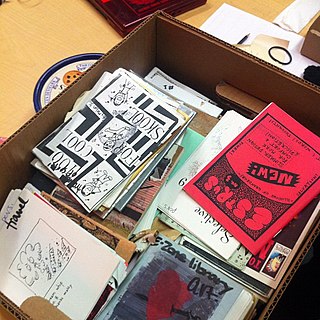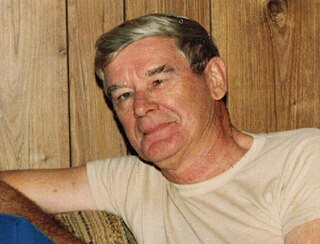
A fanzine is a non-professional and non-official publication produced by enthusiasts of a particular cultural phenomenon for the pleasure of others who share their interest. The term was coined in an October 1940 science fiction fanzine by Russ Chauvenet and first popularized within science fiction fandom, and from there the term was adopted by other communities.

A fandom is a subculture composed of fans characterized by a feeling of camaraderie with others who share a common interest. Fans typically are interested in even minor details of the objects of their fandom and spend a significant portion of their time and energy involved with their interest, often as a part of a social network with particular practices, differentiating fandom-affiliated people from those with only a casual interest.
First Fandom is an informal association of early, active and well-known science fiction fans.

Science fiction fandom or SF fandom is a community or fandom of people interested in science fiction in contact with one another based upon that interest. SF fandom has a life of its own, but not much in the way of formal organization.

A zine is a small-circulation self-published work of original or appropriated texts and images, usually reproduced via a copy machine. Zines are the product of either a single person or of a very small group, and are popularly photocopied into physical prints for circulation. A fanzine is a non-professional and non-official publication produced by enthusiasts of a particular cultural phenomenon for the pleasure of others who share their interest. The term was coined in an October 1940 science fiction fanzine by Russ Chauvenet and popularized within science fiction fandom, entering the Oxford English Dictionary in 1949.

A science-fiction fanzine is an amateur or semi-professional magazine published by members of science-fiction fandom, from the 1930s to the present day. They were one of the earliest forms of fanzine, within one of which the term "fanzine" was coined, and at one time constituted the primary type of science-fictional fannish activity ("fanac").

Lee Hoffman, born Shirley Bell Hoffman, was an American science fiction fan, an editor of early folk music fanzines, and an author of science fiction, Western and romance novels.

Arthur Wilson "Bob" Tucker was an American author who became well known as a writer of mystery, action adventure, and science fiction under the name Wilson Tucker.

Patrick James Nielsen Hayden, is an American science fiction editor, fan, fanzine publisher, essayist, reviewer, anthologist, teacher and blogger. He is a World Fantasy Award and Hugo Award winner, and is an editor and the Manager of Science Fiction at Tor Books.
Fanspeak is the slang or jargon current in science fiction and fantasy fandom, especially those terms in use among readers and writers of science fiction fanzines.
Void was a major science fiction fanzine. It was started in the 1955 by Gregory Benford and his identical twin brother James (Jim) Benford, when they were living in Germany; then later co-edited by Gregory Benford, Ted White, Terry Carr, and Peter Graham. It is described in one reference work thus: "Void was the fanzine with many heads. Its many editors covered all aspects of fanac — criticism, humor, history and commentary." The Benford brothers edited Void until 1958, when Jim retired and Ted White became co-editor. Pete Graham and Terry Carr later joined the editorial team. The fanzine was published regularly until 1962, with a final issue appearing in 1969.
GAFIA is a term used by science fiction fans. It began as an acronym for "Getting Away From It All", and referred initially to escaping from mundane activities via fanac.
Howard DeVore was an American archivist, science fiction collector, dealer, expert on pulp magazines, APA and fanzine writer, con-runner and active volunteer in science fiction fandom.
The Comet, later known as "?" and Cosmology, was an American science fiction fanzine, often considered the first of its kind.

VCON is a fan run fantasy, gaming, and science fiction convention held annually in the metro Vancouver area of British Columbia, Canada. It has been hosted by the West Coast Science Fiction Association (WCSFA) since 1993, and by the Western Canadian Science Fiction Convention Committee Association (WCSFCCA) before that.
The 17th World Science Fiction Convention (Worldcon), also known as Detention, was held on 4–7 September 1959 at the Pick Fort Shelby Hotel in Detroit, Michigan, United States.
Arthur Thomson (1927–1990) was a British artist and writer, a highly regarded member of British science fiction fandom from the 1950s onwards, both as a fanzine writer/editor and prolific artist. Resident illustrator for the influential fanzine Hyphen, he won the TransAtlantic Fan Fund in 1964 and visited the United States. Thomson was nominated five times for the Hugo Award for Best Fan Artist, but never won.
Le Zombie was an intermittent science fiction fanzine, of which 72 issues were published by science fiction fan and author Bob Tucker from December 1938 to August 2001. The first issue was a single, crudely mimeographed sheet; the last printed issue was published in December 1975 by planography. After a 25-year hiatus, Tucker resumed publishing in 2000; these last 5 issues were electronically published as a webzine. The title refers to the "Tucker death hoaxes" which played such a distinctive role in fan history.
The Enchanted Duplicator is science fiction fan fiction written by Walt Willis and Bob Shaw. It was originally published in February 1954, in an edition of 200 numbered copies, and has been reprinted many times, notably in an edition illustrated by Eddie Jones in 1962; in Amazing Stories in 1972/3; and in Warhoon 28, a hardcover fanzine collection of Willis's writing, in 1980.
John Bangsund was an Australian science fiction fan in the 1960s, 1970s, and 1980s. He was a major force, with Andrew I. Porter, behind Australia winning the right to host the 1975 Aussiecon, and he was Toastmaster at the Hugo Award ceremony at that convention.







